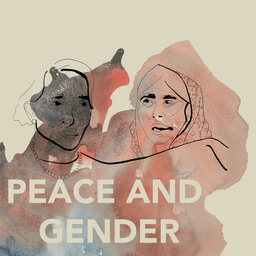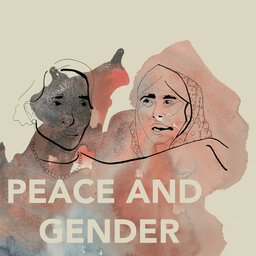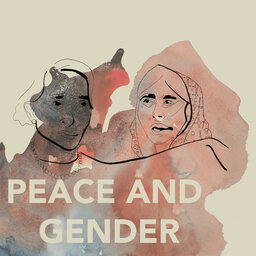In this episode, Andrea Thiis-Evensen meets April Robinson and Tatjana Bosevska, who talk about their research project looking at prejudice-motivated crimes towards Muslim women in Australia today.
TRANSCRIPT
Andrea Thiis-Evensen: Hey my name is Andrea Thiis-Evensen and welcome to Peace and Gender, the podcast about the people behind the research on gender, peace, and security. In each episode, I will meet up with new people coming from all around the world, who specialise in gender, peace and security. In this podcast, I'm trying to not only get a better understanding of the studies, but also the people behind the papers and research and projects. Who are they? Why do they research these issues?
April Robinson: My name is April Robinson.
Tatjana Bosevska: My name is Tatjana Bosevska. Talking is not my strong point.
[Laughter]
Andrea Thiis-Evensen: That's okay.
Tatjana Bosevska: I've been put on the spot.
Andrea Thiis-Evensen: April Robinson and Tatjana Bosevska met while studying international community development. April is an interfaith research and network developer at the Uniting Church and Tatjana recently completed her Masters in Gender and Development. In this episode, they will be talking about their research project that looks at prejudice-motivated crimes towards Muslim women in Australia today. First, I wanted to know, when did April and Tatjana start studying these issues? Here is April's story.
April Robinson: I started studying when I was mature-aged student. I'd had my second child and I'd had an epiphany that I actually had a brain and wanted to use it. It was an incredible moment. I never thought I was academically inclined until I'd had my second child. I really wanted to do something more. I didn't know what I wanted to do. I'd started off in Politics and Psychology, because I really was interested in those two areas. I did a winter subject in Indigenous Studies and some of my classmates were doing something called Community Development. I'd never heard of it before. I was a complete novice, so I switched to it and I have never looked back. It's been an incredible degree and I've met the most amazing people. My peers taught me just as much as my teachers did.
Andrea Thiis-Evensen: What about Tatjana?
Tatjana Bosevska: I initially started studying International Community Development. It wasn't until I was given the opportunity to do my first internship in a woman's rights organisation in Thailand that I realised that what I wanted to do was gender and development, more specifically. Being around grassroots women's organisations and various social movements, I knew that once I came back and once I finished my International Community Development degree that I just wanted to specialise in gender. I just progressed and did my Master's in gender, specifically.
Andrea Thiis-Evensen: When April did her honours degree on the Australian identity, she realised something that led her to the project she's working on today.
April Robinson: I've never really felt like I've fitted in and I'm saying that as a white Australian, who is a few generations Australian. I've never had overt - I've never had any racism. I've never been in any racist situations myself, but I've seen it a lot. I thought that if I didn't feel like I fit in, into a very white Australia, how does it feel for other people who have overt racist situations occurring to them every single day? I wanted to explore that area and what it means to have a national identity and a sense of belonging within your country.
Andrea Thiis-Evensen: Their project, Resilient Women Against Prejudice-Motivated Crimes, focus on Muslim women in Australia today.
April Robinson: The reason we focus on Muslim women is because Muslim women can be - if they're wearing a hijab, or a scarf, or a veil - they can be explicit in their religiosity. There's a lot of fear around Islam at the moment. There wasn't a lot of empirical evidence around the violence that happened to women. I would continuously hear these stories, being in the role - in my job. Every time I would speak to someone, I would hear these stories, and I heard them in a way that it was normalised for people.
The project began to raise awareness of these issues. The project is coming from a church. We're a Christian church organisation, but it's shaped by Muslim women. Muslim women are on the steering committee. I just want to be very upfront about that. I'm very aware of my own positionality, being a non-Muslim woman and not colonising this space but having it shaped and led by the people are affected by the issue.
Andrea Thiis-Evensen: The project started four years ago, looking at the violence towards Muslim women in the public sphere. The focus has changed over the last year.
April Robinson: In the last few years, we've narrowed this down to the problems around reporting such violence - the issues within the police that exist and the issues within the community that exist. For example, there's a lot of ambiguity around what is a reportable crime - the terminology, prejudice-motivated crime. What the heck is prejudice-motivated crime? It's a very ambiguous term. This is the issue that we've narrowed it down to focus on in the last year of this project.
Andrea Thiis-Evensen: Tatjana joined the project in October 2017. She works on putting together all the data that April has collected from Muslim women over the last four years.
Tatjana Bosevska: Using the data and the stories to facilitate referral and reporting tool that we're hoping to put together. That will enable victims of prejudice motivated crime to be able to have more information, know where to report, know where they can seek services if they need support. We're undertaking semi-interviews at the moment - in-depth interviews, drawing more stories and more in-depth stories, particularly around issues of resilience, looking at how Muslim women in the community are responding to the violence that's being targeted toward them.
April Robinson: Sorry, I just have to add how amazing Tatjana is. Her job was huge. I had years and years of people's stories and data that I'd collected in the forums that we had done. They were just sitting on the shelf. I hadn't been able to do much with it, just being the only person working consistently on the project. Tat has come together and she's analysed this data. She's put it into a cohesive narrative. On top of that, she is also looking at the legal ramifications and the policing ramifications around prejudice-motivated crimes. She's been amazing. She sells herself short…
Tatjana Bosevska: [Laughs]
April Robinson: …and she shouldn't.
Andrea Thiis-Evensen: Why is the issue of prejudice crimes important to look at today?
April Robinson: I'm in this bubble for so much of my time that I forget that other people don't realise that racism actually happens. Until I go out and I speak about my work, and I get hit with questions like, does it really happen that often? I ride the trains. I don't see anything happening. Why don't women just take off their headscarf and then they won't have a problem? Stuff like that.
The fact that I get those questions very often when I'm speaking to people really goes to show that this research and this project is incredibly important to shine a light on what's actually happening - what's happening with these people, the incidents that they go through but also the structures that exist that enable this type of violence to be perpetuated.
Andrea Thiis-Evensen: April and Tatjana both feel that the issue of prejudice crimes is important to talk about for many reasons.
April Robinson: Physical attacks on Muslim women are often not recognised because they tend to be invisible. It can be everything from just micro-aggression behaviour of other people - so, micro-aggressive behaviour of other people - to outright discrimination and criminal behaviour.
What I've found when listening to women who are telling their stories, not only does no one seem to see it around, when it’s happening in the public, but they're also with their children as well, a lot of the times. There's not a lot of women who are going to face up to an aggressor when they've got their children there. Their first thought is to protect their children and to just get away from this aggressor. Another problem is that it does happen, like I said, on a micro-level. It can be anything from being ignored in a shop to not being able to get a job because you have a Muslim-sounding name or you wear the hijab.
I was just speaking to someone today who spoke of a friend who is a hairdresser and wears a hijab and couldn't get a job. She took it off and surprise, surprise, she got a job. These stories are just across the board but they're also invisible. There's not a lot of people who are speaking about it. There are people who are speaking about it but there's not a lot of people who are listening to these stories and taking them into account as something that actually affects people and needs to be addressed.
Andrea Thiis-Evensen: After I moved to Australia, I've met many people who have multicultural backgrounds. A thing that often comes up in conversations is the feeling of otherness. My friends were born in Australia and, like many other people, they sometimes feel like they're seen as different just because of where their families are from. Tatjana herself knows this feeling.
Tatjana Bosevska: I think many migrants have a similar story. They experience similar narratives. They feel in a similar way about knowing that they're different in this country. We're reminded of it. Whether or not you're Muslim, whether you're from an Asian background, Chinese, or from India or from - I'm from Macedonia. Growing up, I was called a wog. It was just what we were called. It was normalised. I was told to go back to where you came from. I think, hearing those narratives, for me, 20 years on, just cements why it’s so important that we shine a light wherever we can, to say that this is still going on. It's no longer acceptable.
Andrea Thiis-Evensen: April and Tatjana are working on a tool that will make it easier to report prejudice-motivated crimes. A part of this project has been to look at how the police force deals with prejudice-motivated crimes, as Tatjana goes on to explain.
Tatjana Bosevska: Story after story, we heard repeatedly. Comments we heard repeatedly was, what was the point in actually reporting to the police? A very - I think - interesting aspect that also came up was prejudice within the police force, as well. Women would feel re-victimised, going in to actually make a report. A lot of the stories and the literature - I mean, even when you hear police speak - a lot of the onus of the responsibility to actually do something about this is placed on victims. I think what this project has taught us is that offering people a space, actually, to share their stories casts a light back onto the structures that enable this violence to happen in the first place. It's forced us to look at the media. It's forced us to look at Victoria Police. It's forced us to look at our government policies and narratives. It's not just Muslim women that are affected. You can expand it to broader context, where you're involving other racial ethnic minorities. It's enabled us to actually look at a broader picture and I think that's what we're hoping, with the tool, that we can actually provide people with a resource. There's a place for someone who's subjected to prejudice-motivated violence to go.
Andrea Thiis-Evensen: April tells me more about the stories that she's heard over the last four years.
April Robinson: Over the last three to four year, I would have spoken to hundreds of women. I've heard so many stories. I can tell you a few of them. One woman told me about someone trying to set her hijab on fire from the back, when she was walking down the street. I've heard multiple stories of items being thrown into car windows, when women are driving with their children in there and abusive racist taunts being also delivered with that object thrown in the window.
I've heard so many stories of women being spat on, their children being spat on. There are so many different elements to this and to racism and to prejudice that exist. I, as - not even as an Australian, but I, as a human being, will not stand for this type of behaviour, whether it be racism or sexism or ableism or anything, in the place where I live. If I'm in a position, which I am lucky enough to be in a position for the place that I work in. If I'm in a position to try and mitigate or try and help this in any way, then that's what I'll be doing.
Andrea Thiis-Evensen: That was April Robinson and Tatjana Bosevska. Thank you so much for listening to this episode of Peace and Gender. My name is Andrea Thiis-Evensen and this podcast was produced for Monash Gender, Peace, and Security, and Mojo News.
Music: "Solitude" by Broke for free – Creative Commons Attribution-NonCommercial-
Artwork: Shayla Rance
 Peace and Gender
Peace and Gender

